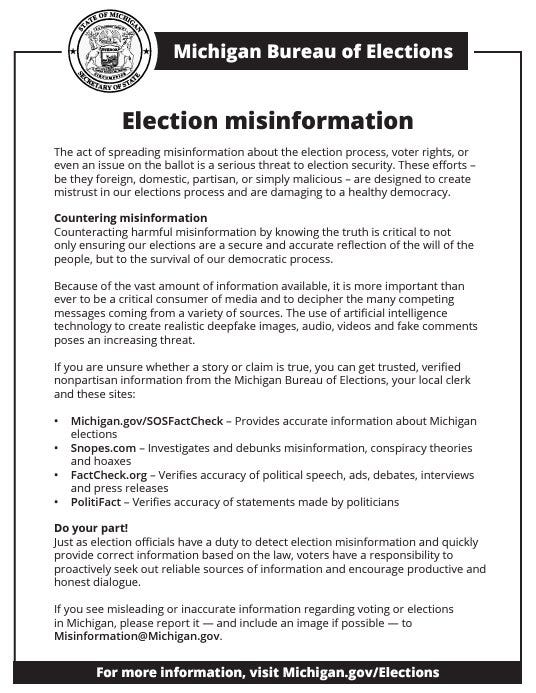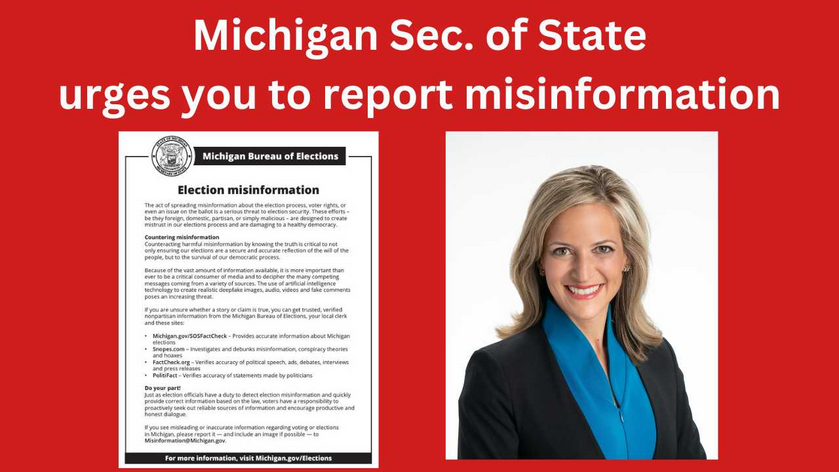LANSING, Mich - As the November election approaches, Michigan Secretary of State Jocelyn Benson is urging residents to report any instances of election misinformation they encounter. Benson, a Democrat, has emphasized the importance of maintaining election security and integrity, encouraging citizens to be vigilant about misinformation related to the election process and voter rights as reported by The Federalist.
In a statement released by her office, Benson described misinformation as "a serious threat to election security." She has asked Michigan residents to report misleading or inaccurate information regarding voting or elections via email at [email protected], including images when possible. This initiative is highlighted on the "voter education resources" page of the state's website.
I walked away from the mainstream media to report stories like this. If you haven’t yet already, become a paid subscriber to help keep my mission of independent journalism alive. $5 a month, you can quit at anytime.
Benson's office did not respond to inquiries from The Federalist about the specific handling of these reports or the measures taken in response to alleged misinformation. However, a separate document from her office described misinformation as "the most potentially damaging threat to our democracy," blaming "partisans, grifters, and other opportunists" for spreading falsehoods and urging citizens to hold those accountable for disseminating false information.

The document further encourages residents to rely on trusted sources for election information, directing them to the state's fact-checking page as well as external sites like FactCheck.org, PolitiFact, and Snopes. These platforms have faced criticism for perceived political bias.
Additionally, Benson announced the launch of a new "Democracy Ambassador" program designed to engage residents in combating election-related misinformation. Participants in the program will receive "nonpartisan facts and resources" from the state and are encouraged to share these within their communities. The program aims to "squash misinformation before it spreads" and includes steps such as signing up to receive and distribute approved information and volunteering as poll workers.
Michigan Attorney General Dana Nessel, also a Democrat, has spoken on the importance of collaboration between officials and the media to tackle misinformation on social media platforms. This comes as Benson faces scrutiny for alleged election integrity issues, including accusations of failing to address inaccuracies in voter rolls and hosting controversial figures linked to past election funding practices.
Benson's office has been criticized for its association with Vote411, a platform alleged by The Federalist to participate in data harvesting. Despite requests for comment, her office has not addressed these allegations publicly. Additionally, her guidance on absentee ballot signatures, which provided a "presumption of validity," was recently deemed unconstitutional by a Michigan judge.
As the election nears, Benson continues to advocate for proactive measures to protect Michigan's electoral process from misinformation and ensure a fair and secure election environment.
Why is it the government’s job to decide what is misinformation? I posted the iconic photo of Former President Trump moments after his attempted assassination attempt and META rules the picture to be misinformation.

Meta admitted publicly this was a mistake and would correct the issue. I am still waiting.
Letting big tech and the government decide the definition of misinformation is dangerous.




















